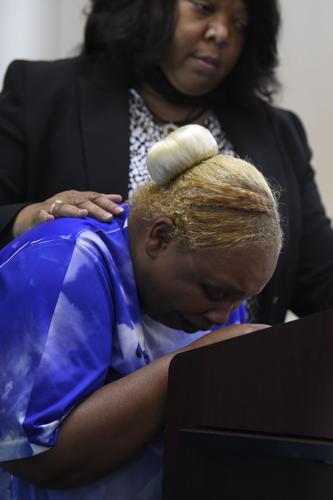
Vickie Hambrick is overcome with emotion as she speaks in court where Andrew Delke pleads guilty to manslaughter on July 2, 2021, for the 2018 killing of her son, Daniel Hambrick.
“We didn’t even get a chance,” screamed Daniel Hambrick’s cousin at the July 2 court hearing in response to District Attorney Glenn Funk’s plea agreement with now-former MNPD Officer Andrew Delke. Delke, a white police officer, shot Daniel Hambrick, a Black man, three times in the back on July 26, 2018.
From the view of Blacks long victimized by excessive sentencing, wrongful convictions and racial profiling, the plea deal had echoes of a Jim Crow criminal justice system. Delke received only a three-year sentence with a likelihood of being released in a year-and-a-half despite a grand jury indictment for first-degree murder. He is serving the sentence in Davidson County (not a maximum- or medium-security prison) in a cell with a private shower and away from the general population. The plea deal was negotiated without the knowledge or consent of the Hambrick family, just two weeks before the trial was to commence.
DA Funk did his best to portray the agreement as a historic occasion because it was the first time a Nashville police officer was sent to jail for killing a Black person. Hambrick’s family and Black community advocates, however, rejected the decision and saw it for what it is — a huckster’s agreement.
Protests, shouts of disapproval and anger expressed by the Hambrick family disrupted the faux decorum of Judge Monte Watkins’ courtroom. The Hambricks cursed Delke, Funk and the criminal justice system writ large. Vickie Hambrick, the mother of Daniel, lunged at Funk in a fit of righteous anger. The collective rage was a refreshing display of Black resistance and an unapologetic cry for justice.
Black rage cuts against the grain of middle-class respectability. It shatters the image of racial etiquette that defines Nashville’s political culture. In historian Vincent Brown’s award-winning book Tacky’s Revolt: The Story of an Atlantic Slave War, which documents the Jamaican slave wars, Brown tells us that rebellion can lead to large-scale transformations such as freedom for the enslaved or territorial acquisition. As reinterpreted today, rebellion has the potential to transform the criminal justice system or overhaul police departments.
Yet institutional transformations are difficult to achieve in societies where racial and economic subjugation is the norm. The hope then, as Brown states, is that rebellion and rage can give the injured and oppressed a chance to reclaim their dignity and self-worth. By disrupting the courthouse decorum, the Hambrick family fought back and demanded respect. Their unscripted and unbounded rage delegitimized a criminal justice system that has been unforgiving and vulturous to Nashville’s Black and Brown communities and the poor.
Black rage can be unpredictable and may lack political discipline, but it offers important lessons for those who seek to understand it. Martin Luther King Jr. saw Black rage up close in the Watts and Chicago disturbances in the mid-1960s. He heard it from poor Black women in the Mississippi Delta during the Poor People’s Campaign in 1968. His internal compass forced him to listen and learn from Black rage with the hope that it can be converted to transformative change.

Andrew Delke stands before the court as he pleads guilty to manslaughter on July 2, 2021, for the 2018 killing of Daniel Hambrick.
For some observers, the Hambrick family’s fury was out of bounds. In his best version of racial troping, David Raybin — the attorney for Delke, who has also represented the Fraternal Order of Police — called the demonstrative behavior a “riot.” Had the Hambrick family withheld their rage, however, their position about the plea deal could have been interpreted as submissive and cooperative.
Hambrick’s mother, although legally blind, saw clearly through the morally bankrupt proceedings. More than anything, her rage painted a different picture of her son than the North Nashville criminal that the Metro Nashville Police Department intended to depict after Delke killed him. Despite Vickie Hambrick’s disability, Daniel was never “ashamed of or embarrassed by” her, as noted by a statement delivered by Joy Kimbrough, the family attorney. The mother’s outrage recast her son as both her “eyes” and as a caregiver who sewed family bonds.
The utter unfairness of the plea deal was not lost on longtime advocates in the courtroom. Earlier in the week, a young Black woman was convicted for the same charge as Delke — first-degree murder — and sentenced to the mandatory 51-year prison sentence. The contrasting sentence — 51 years with no chance of parole for a Black woman, compared to a short jail stint for Delke — exposes a rigged and antidemocratic system that failed the Hambrick family.
A day before the court hearing, activists learned that Funk may have possibly reached out to influential Black Nashvillians with the hope that they would help him spin the plea deal as a step in the right direction. This was to be expected. The city’s political establishment — from mayors and district attorneys to councilmembers and the business community — has spent decades trying to cultivate a Black managerial class to defend racially problematic decisions when necessary.
Yet on this issue, Black leaders refused to be Funk’s accomplice and rejected his overtures. Black and civil rights organizations universally condemned the decision — including the Napier-Looby Bar Association, the Metro Council’s Minority Caucus, the NAACP’s Nashville Branch and the Tennessee Conference of the NAACP.
In the end, Nashville may move past the trial and continue with business as usual. Funk may be re-elected in 2022. The Black managerial class, perhaps, will retreat to protecting a political regime that deems it inferior. The overhaul of the criminal justice system and police department that activists have long clamored for may not happen soon.
Yet the rage will continue to simmer and hopefully translate into the kind of political agitation that unsettles the power structure. If so, we have the Hambrick family to thank.






